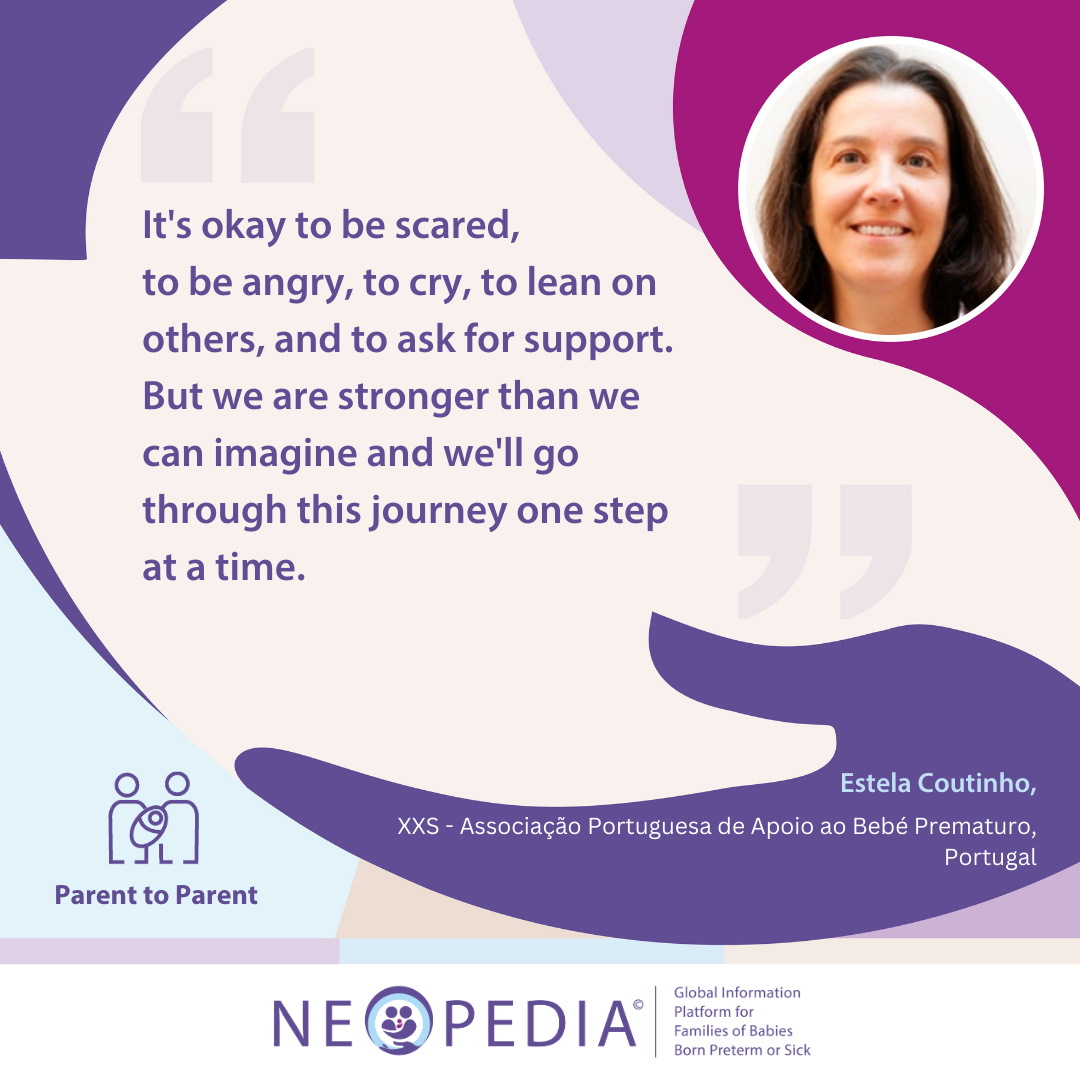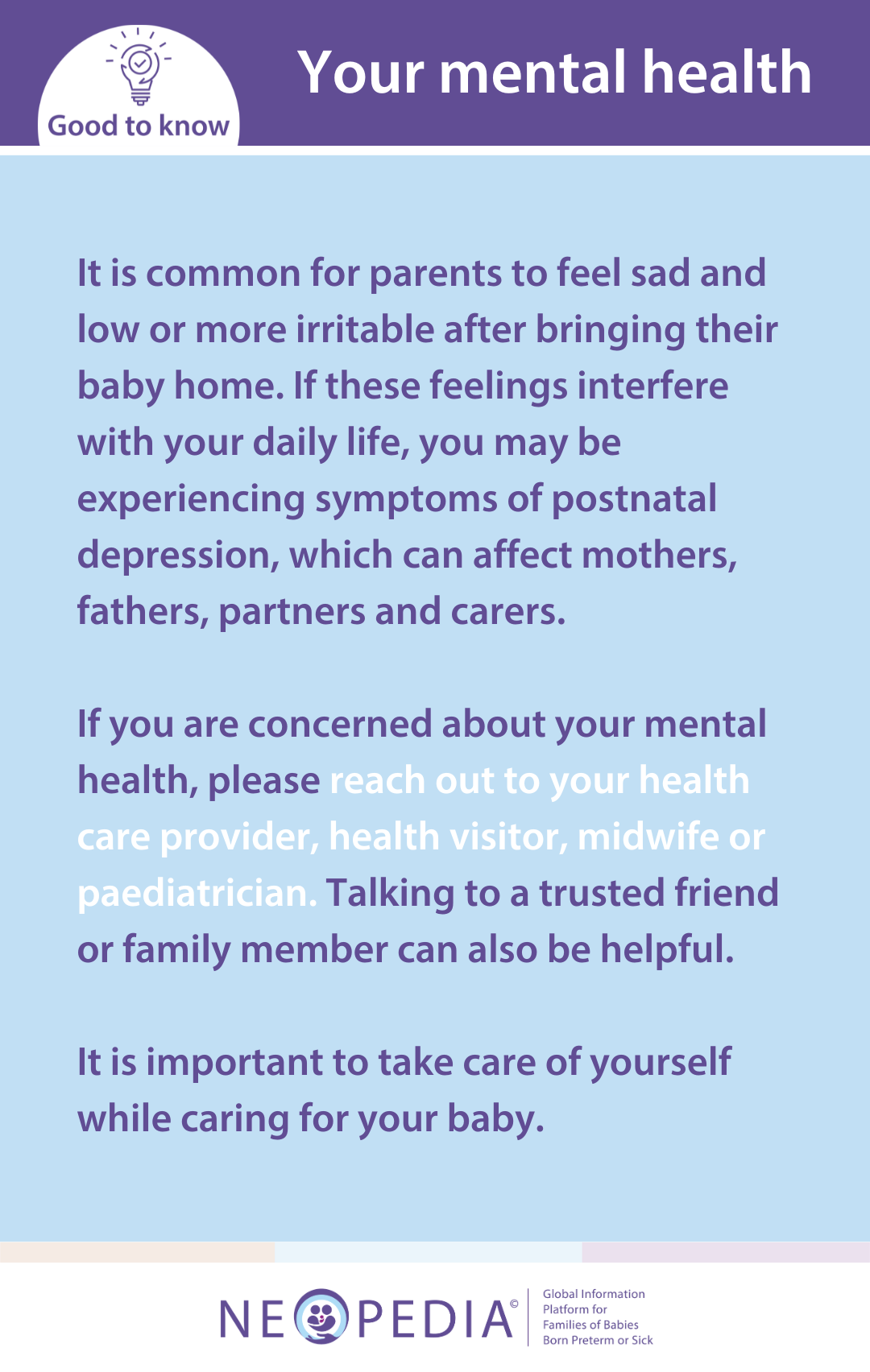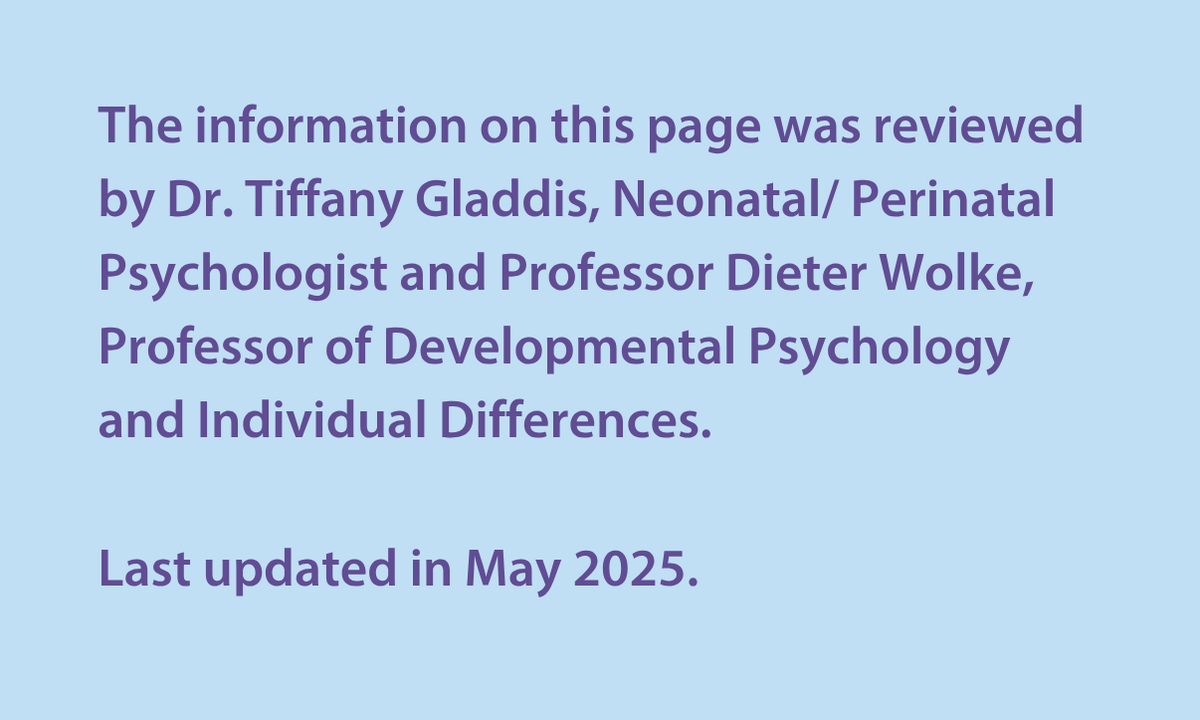
Having a baby, whether it is your first or not, is a significant life change. Many parents experience mixed emotions, especially as they prepare to go home without the daily support of the NICU care team. Balancing practical tasks, like managing bills and meals, can add to the stress. Do not hesitate to reach out to the NICU care team, other healthcare professionals, or local support groups. They are there to help you through this transition.
It is also common for parents to experience post-natal anxiety⍰, post-traumatic stress (PTSD)⍰, or postnatal depression (PND)⍰ due to the stress of a difficult birth, unexpected medical treatments, feeling that your body failed, worry about your baby's health, loss, or being separated from your baby after birth. Those who have not been through it themselves, may find it difficult to fully understand what it is like to have a baby in neonatal intensive care. Taking care of your mental health is essential, and many find comfort in peer support from other parents who have been through similar experiences.
If you feel overwhelmed or notice changes in your mood, sleep, or eating habits, reach out to healthcare providers, family, or friends for support. Accessing this help can make a big difference for you and your baby.
Unfortunately, it can be the case that parents in the neonatal unit have little or no access to psychological support. Even after leaving the unit, some parents still struggle to find the help they need. Getting support from healthcare professionals and local parent groups can make a big difference in overcoming these challenges and improving your mental health.
It is natural to feel anxious when your baby is born preterm or sick and is in hospital. Uncertainty about the baby's condition and future can be distressing. You may feel out of control and have many questions. The hospital environment, with unfamiliar staff and surroundings, can intensify these feelings.
It is also very normal to feel overwhelmed by the information you receive. It is okay to ask for explanations from the healthcare team to be repeated as many times as you need. This is common in situations of emotional shock.
If you experience persistent anxiety⍰, it is essential that you seek support. You can talk to healthcare team members you feel comfortable with, who can offer advice and help you or signpost you to who can help you to manage your anxiety.
Postnatal depression (PND) is different from the temporary “baby blues” that many new parents feel. PND involves persistent feelings of sadness, fatigue⍰, anxiety⍰, and difficulty feeling emotionally connected with the baby. It can also manifest as feeling low, struggling with daily tasks, or having difficulty finding joy in previously enjoyable activities. Importantly, PND is not a sign of weakness or failure, and seeking support is a proactive step toward feeling better.
It is common for fathers and partners to feel depressed too, even though PND is usually diagnosed in mothers. The emotional toll of having a baby in neonatal care increases the likelihood of PND for both parents. Recognizing and addressing these feelings early is important, as research shows that high levels of stress and strain can persist for years – up to 5-6 years – after a preterm or sick baby’s birth.
If you are feeling overwhelmed, it is important to know that these feelings are valid, and you are not alone. Support from healthcare professionals, such as those in neonatal care units, is available to help parents. Mental health support can make a significant difference, and talking openly about your experiences can be the first step.
Post-traumatic stress disorder is also common among parents who have gone through a traumatic birth or a medical emergency with their baby. Symptoms like flashbacks, nightmares, and constant anxiety are normal after trauma but can become a problem if they last for weeks or months.
Post-traumatic stress disorder can be triggered by events such as emergency surgeries or being separated from the baby. Both mothers and fathers, or any caregiver can experience post-traumatic stress disorder. Partners and other family members may also feel traumatized from seeing their loved ones go through such difficult situations.

Taking your baby home from the neonatal unit is an important and often emotional milestone. While it might be exciting to start life at home, it is also common to feel insecure without the support of the unit staff.
Many parents experience a mixture of emotions, from joy to feelings of being overwhelmed and isolation. You may miss the reassurance of the neonatal team and feel less confident in your ability to care for your baby.
Remember that there is no right or wrong way to feel during this transition.
The neonatal team will not let you go unprepared. Many units have discharge plans that are discussed with you, which can help to ease any anxiety⍰ you may be feeling. Some associations provide arrival guides for home care, offering clear and timely information to help you focus on the most important points when you need them. It may help to have prepared a checklist to make sure everything has been addressed before you leave.
Losing a baby is a heartbreaking experience that can deeply affect parents. The heavy feelings of sadness and loss can be hard to cope with, and these emotions may come back on important dates like birthdays, making those times even harder. Grief is different for everyone and has no set time to heal. If you are a grieving parent, help is available through your neonatal unit, general practitioner or perinatal bereavement associations to help you through the grieving process. Remember, it is okay to ask for support when you need it.
You might feel sadness for the things you imagined but did not come true, like a certain birth plan or those first special moments with your baby. Letting go of these lost hopes can be hard and may leave you feeling sad or guilty. It is important to understand that these feelings are common. Everyone handles their emotions differently, and that is okay. Seeking support can help you work through these difficult feelings.

